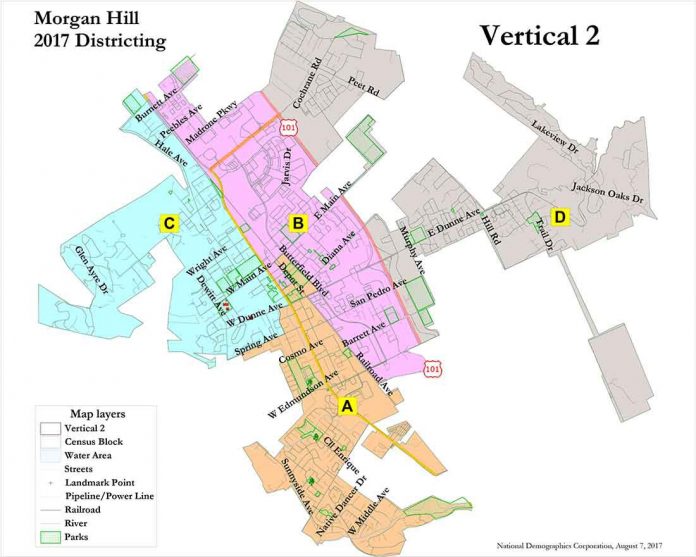The Morgan Hill City Council settled a California Voting Rights Act claim from an Oakland law firm for $25,000, according to the city attorney.
The settlement, approved on a narrow 3-2 council majority, ends the legal saga that forced the council to change to a district-based local election system starting in November 2018.
The council met in closed session Oct. 18 to discuss the claim filed by law firm Goldstein, Borgen, Dardarian & Ho. The firm, which sparked the city’s change from at-large to district elections in May with a demand letter to the council, initially filed a claim for $30,000, the maximum allowed for damages under applicable election laws.
However, the council voted to negotiate a $25,000 settlement with the Oakland firm, Morgan Hill City Attorney Donald Larkin said. That settlement was negotiated and approved by both parties Nov. 2.
The settlement includes a “full release from (further) claims under the Voting Rights Act,” Larkin said at the Nov. 15 council meeting.
Mayor Pro Tem Larry Carr and City Councilmember Rich Constantine voted against the settlement in the Oct. 18 closed session.
The council reluctantly approved the switch to district-based elections after receiving the May 1 demand letter from the Goldstein firm, which represented Morgan Hill residents Armando Benavides, Sally Casas and Brenda Cayme—all of whom are Latino. The firm claimed that the city’s at-large system, which has been in place since Morgan Hill was founded in 1906, violates the CVRA because it limits the influence of minority groups.
Benavides and Cayme have previously run for elected office in Morgan Hill, but have not won an election.
After the council approved the change in election systems this summer, they spent several months working with a professional demographer and community members in drawing four geographical districts within the city limits, equal in population and each one represented by a single councilmember.
Throughout the process, councilmembers complained that the new district-based system is unlikely to produce its intended effect of giving more voice to minority groups living in Morgan Hill. Instead, the incumbents think the system will severely limit the pool of qualified candidates for council.
But the council adopted the change out of fear that fighting the demand letter could result in substantially higher legal costs. Larkin noted that no city has ever successfully challenged a CVRA claim. With the council agreeing to change to a district-based system, the law caps any damages owed to a plaintiff at $30,000.
Carr and Constantine said they didn’t think the Goldstein firm deserved even the $25,000 that the majority of the council agreed to settle for.
“They weren’t really showing what they spent the money on, or their billable hours,” Constantine said. “It was more out of principle than anything else (but) if we took them to court it would have cost more.”
He added “this is what happens in cities throughout California” when challenged under the CVRA.
Constantine said even the four districts approved in September by the council under the new election system are unlikely to result in better representation for minority groups such as Hispanic voters—which was the stated intent of the residents represented by the Goldstein firm.
“There is really no advantage (to district elections) from what I see, other than it’s going to be cheaper for everyone to run,” Constantine said. He added, “Sometimes the remedy doesn’t work in every situation.”
Carr added the demand letter and claim by the Goldstein firm and its clients amounted to a “frivolous lawsuit” that was “forced” upon the city. He also doesn’t think the expenses claimed by the firm are justified.
“I was hoping that we could see from (the Goldstein firm) some of their data (and) analysis they did that made them come to the conclusion that underrepresented people in Morgan Hill are disenfranchised when to comes to voting, and they did not want to produce any of that kind of information,” Carr said. “So I just think…they didn’t earn the amount that they were asking for.”
The by-district system will start with the November 2018 election, when the seats occupied by Constantine and Councilwoman Caitlin Jachimowicz will be on the ballot. The seats occupied by Carr and Councilmember Rene Spring will next appear on the November 2020 city election ballot.
The mayor will continue to be elected at large, every two years, under the district-based system.








